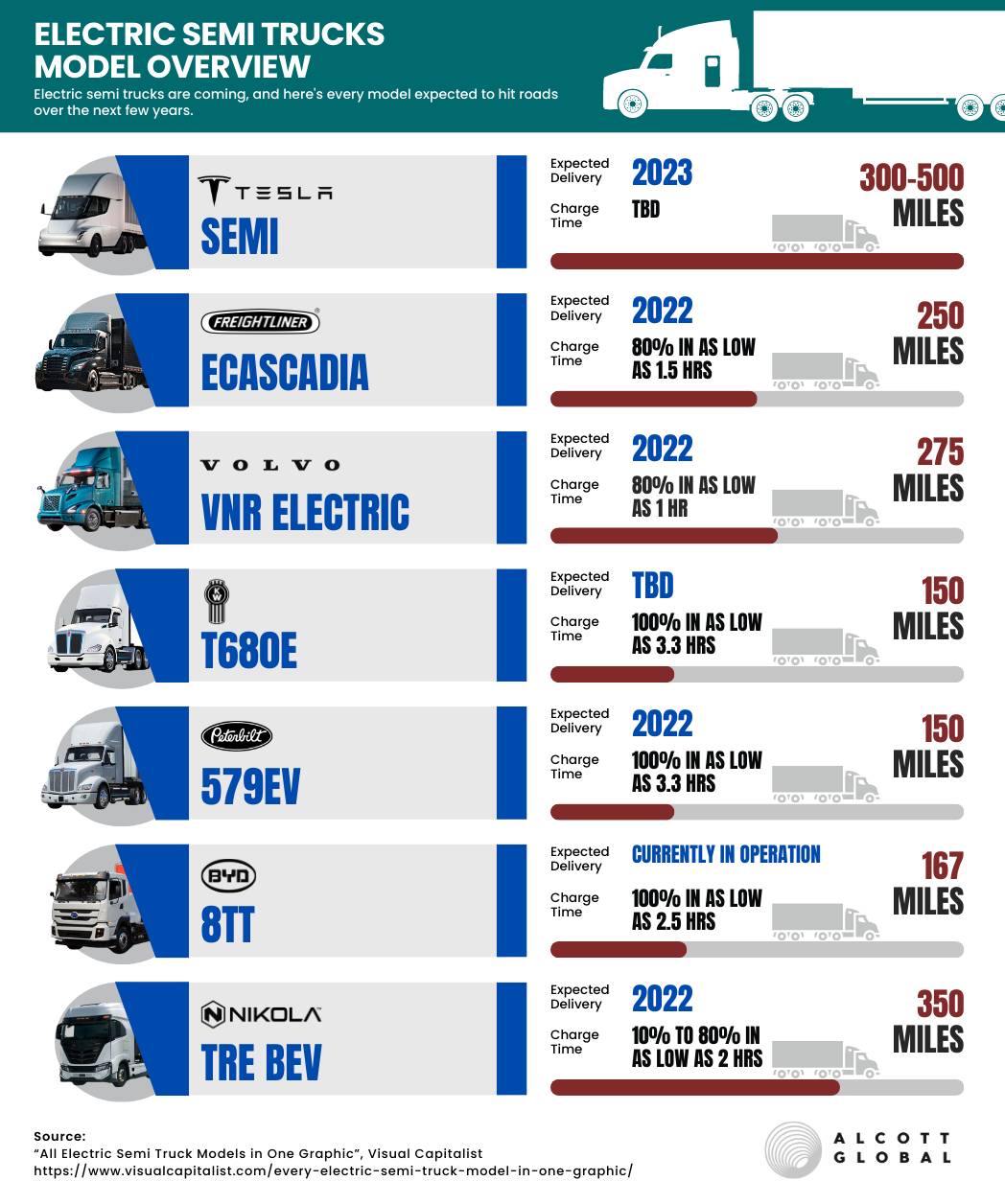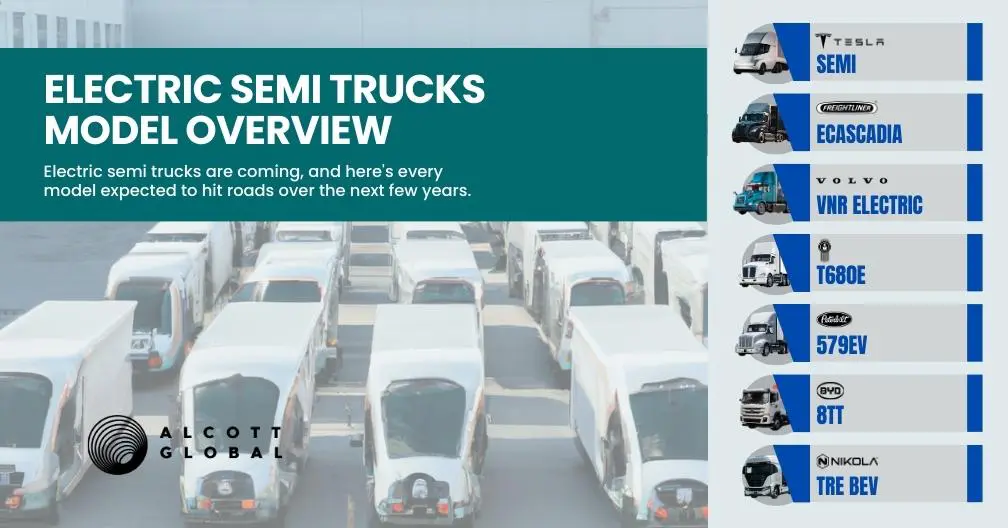
Electric semi truck models, also known as electric semi-trailer trucks or electric tractor-trailers, are changing the game in the trucking industry by offering a more sustainable and efficient alternative to traditional diesel trucks. There are several electric semi truck models that are set to be released in the near future, as the demand for more sustainable and efficient heavy-duty vehicles continues to grow. It is likely that more models will be released in the coming years. These upcoming electric semi truck models offer a glimpse into the future of the transportation industry, with advanced technologies and greater sustainability at the forefront.
Here are some of the most highly anticipated electric semi truck models:
- Tesla: Semi (Expected Delivery: 2023)
- Freightliner: eCascadia (Expected Delivery: 2022)
- Volvo: VNR Electric (Expected Delivery: 2022)
- Kenworth: T680E (Expected Delivery: TBD)
- Peterbilt: 579EV (Expected Delivery: 2022)
- BYD: 8TT (In Operation)
- Nikola: Tre BEV (Expected Delivery: 2022)
Although the electric semi truck market is still in its nascent stage, many companies are testing or have begun deploying these vehicles. With Tesla’s Semi being the only one to have received pre-orders from major companies, the rest of the electric semi trucks are either in operation or planned to be in operation in near future. However, it’s worth noting that delays in the electric vehicle industry are common, so the expected delivery dates should be taken with caution.
Range
When it comes to range, electric semi trucks are still facing the challenge of traveling long distances. The range of an electric semi truck is determined by the size of its battery and the energy efficiency of its components. Tesla and Nikola are currently promising some of the highest figures in terms of range for their electric semi trucks, with both companies aiming for a range of over 300 miles per charge.
On the other hand, the rest of the companies in the electric semi truck market are targeting a range of between 150 and 275 miles per charge. While these ranges are still significant improvements over previous electric semi truck range figures, they fall short of the ranges promised by Tesla and Nikola.
Charge Time
Comparing charge times for electric semi trucks can be challenging due to the various factors involved, such as the amount of charge and the type of charger used. Nikola, for instance, states that it will take 2 hours to charge its Tre BEV from 10% to 80% when using a 240 kW charger.
It’s also worth mentioning that charger technology is evolving rapidly. Companies like Tesla are rumored to be developing a 1 MW (1,000 kW) charger, which could add 400 miles of range in just 30 minutes. This signifies the ongoing effort of companies to improve charging infrastructure and make charging faster and more efficient.
Benefits of Electric Semi Trucks
Electric Semi Trucks have various benefits, such as their reduced environmental impact, improved efficiency, and reduced maintenance requirements, as well as some of the challenges that need to be addressed before they can fully replace diesel trucks, such as their limited range and higher upfront cost.
In addition to their environmental benefits, electric semi trucks also have several other advantages over their diesel counterparts. For example, they are much quieter than diesel engines, which makes them better suited for use in urban areas or residential neighborhoods. They also require less maintenance, as they have fewer moving parts than diesel engines, and they can potentially save companies money on fuel costs over the long term.
How is Electric Semi Truck Changing the Game?
As electric semi truck technology continues to improve and become more widespread, it is likely that these models will play an increasingly important role in the industry. Here are some ways in which electric semi truck models are changing the game:
Reducing emissions: One of the main benefits of electric semi trucks is their reduced environmental impact. Unlike diesel engines, electric motors produce zero emissions, which means that electric semi trucks do not contribute to air pollution or climate change. This is a significant advantage for companies looking to reduce their carbon footprint and meet increasingly strict emissions regulations.
Improving efficiency: Electric semi trucks are also more efficient than diesel trucks in terms of energy consumption. They have a lower energy consumption per mile, which means they require less energy to move and can potentially save companies money on fuel costs over the long term.
Reducing noise: Electric semi trucks are much quieter than diesel trucks, which makes them better suited for use in urban areas or residential neighborhoods. This can be a major advantage for companies that operate in these types of areas and want to minimize the impact of their trucks on the surrounding community.
Requiring less maintenance: Electric semi trucks have fewer moving parts than diesel trucks, which means they require less maintenance and may have a longer lifespan. This can be a major advantage for companies that operate a fleet of trucks, as it can help to reduce downtime and save on maintenance costs.
Numerous Use Cases For Electric Semi Trucks
There are a number of benefits that make them well-suited for a variety of use cases. As electric semi truck technology improves and becomes more widespread, it is likely that it will play an increasingly important role in the transportation industry. There are numerous use cases for electric semi trucks, including:
Urban delivery
Electric semi trucks are well-suited for use in urban areas due to their low noise levels. This makes them an attractive option for companies that need to make deliveries in residential neighborhoods or other areas where noise pollution is a concern.
Short-haul transportation
Electric semi trucks are particularly well-suited for short-haul transportation, as their limited range (typically a few hundred miles on a single charge) makes them less suitable for long-distance hauls. However, their reduced emissions and improved efficiency make them an attractive option for companies that need to transport goods over relatively short distances.
Last-mile delivery
Electric semi trucks can be used for last-mile delivery, which refers to the final leg of a delivery journey from a transportation hub to the final destination. This can be a particularly attractive use case for electric semi trucks due to their reduced emissions and improved efficiency.
Port and terminal operations
Electric semi trucks can be used for transporting goods within the port and terminal operations, where the distances traveled are often relatively short. Their reduced emissions and improved efficiency make them an attractive option for these types of operations.





